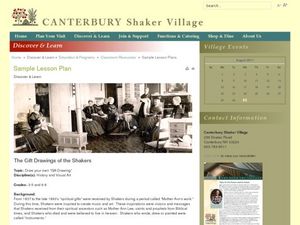Curated OER
The Four Sacred Elements
Fourth graders observe the Four Sacred Elements image in PowerPoint as projected on a screen and discuss what they see and then summarize the details. They discuss what the image represents and how the Four Sacred Elements are an...
Curated OER
1960's Protest Songs
By learning about 1960's protest songs, and the politics of the era, students can broaden their understanding of music and history.
Curated OER
The Gift Drawings of the Shakers
Students create their own "gift drawings" that are inspired by the dreams and visions of the Shakers. In this gift drawings lesson plan, students learn the history of the Shakers, make their own drawing, and practice elements of design...
Curated OER
Comparing the Confessional traditions that Emerge from the Reformation
Ninth graders examine the Protestant Reformation. For this World History lesson, 9th graders research various places of worship. Students comapre and contrast the different sects of religion that resulted from the Protestant Reformation.
American Museum of Natural History
Piecing It All Together
Archaeology digs are much like giant jigsaw puzzles. The artifacts found are often in pieces and scientists must reconstruct them. A hands-on activity lets young archaeologists experience this facet of the job as they create, smash, and...
Curated OER
Traditions of Tribal Sharing
Students examine the idea of tribal sharing in the Native American community. They read a story about Native Americans and note the ways they are helping others. They draw a picture showing one of these acts.
Curated OER
A Study of "Twilight Crane" by Kinoshita Junji
Young scholars read and analyze the Japanese play, "Twilight Crane," by Kinoshita Junji. They read a handout on Japanese theatre, conduct Internet research, answer discussion questions, and compare/contrast versions of the story.








